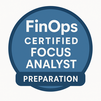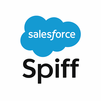
Dive into the essentials of Salesforce Financial Services Cloud with our focused training course. Explore key features, data models, and customizations specific to the financial services industry. Learn how to effectively manage client relationships and streamline processes to enhance productivity and compliance. This course is designed to equip you with the practical skills and insights needed to excel in deploying Salesforce FSC in real-world scenarios.
Salesforce FSC Interview Questions - For Intermediate
1. What are Opportunity Teams in FSC?
Opportunity Teams in FSC allow users to collaborate on sales opportunities by assigning roles and responsibilities to different team members, improving coordination and driving successful outcomes.
2. How does FSC facilitate goal tracking for clients?
FSC facilitates goal tracking by allowing financial advisors to set, monitor, and manage financial goals for their clients through dedicated tools, helping in aligning financial strategies with client objectives.
3. What is the significance of the Coverage Team in FSC?
The Coverage Team feature in FSC represents the group of professionals assigned to service a client's account, ensuring all aspects of the client's financial needs are addressed collectively.
4. Describe the Wealth Management model in FSC.
The Wealth Management model in FSC offers a comprehensive approach to managing a client’s wealth, focusing on investments, risk management, and estate planning, integrating all data points for holistic financial advice.
5. How does FSC support personalized client communications?
FSC supports personalized client communications through integrated Marketing Cloud capabilities, allowing for automated, targeted, and personalized messages based on client data and behavior.
6. Explain the importance of the Referral object in FSC.
The Referral object in FSC tracks referrals of potential new clients from existing clients or other sources, critical for expanding business through network and relationship management.
7. What role does the Asset object play in FSC?
The Asset object in FSC tracks individual items of value owned by a client, such as real estate or vehicles, which are crucial for comprehensive asset management and financial planning.
8. How is client risk tolerance handled in FSC?
Client risk tolerance in FSC is managed by profiling and recording individual risk preferences, which helps advisors tailor investment strategies and financial recommendations to suit the client's comfort with risk.
9. Can you describe the Insurance functionality within FSC?
The Insurance functionality in FSC helps manage insurance policies, claims, and coverage details, providing a comprehensive view of insurance-related financial products for clients.
10. How do Event Logs work in FSC?
Event Logs in FSC record and store all client-related activities and interactions, ensuring compliance with industry regulations and aiding in audit processes.
11. What is a Client Segment in FSC, and why is it important?
A Client Segment in FSC categorizes clients based on certain criteria like wealth, risk tolerance, and investment preferences, helping advisors tailor services and communications effectively.
12. Explain how Document Checklist is utilized in FSC.
Document Checklist in FSC is used to track required documents from clients, ensuring all necessary information is collected for account opening, compliance, or other financial services.
13. How does FSC handle retirement planning?
FSC aids in retirement planning by allowing advisors to create and manage retirement goals, simulate scenarios, and track progress towards achieving these goals.
14. What are the typical customizations done in FSC?
Typical customizations in FSC might include creating custom objects to handle unique data, integrating third-party applications for additional functionalities, or modifying user interfaces to fit specific workflows.
15. How does conflict of interest management work in FSC?
Conflict of interest management in FSC involves tracking and managing situations where an advisor’s personal interests might conflict with those of their clients, ensuring ethical standards are maintained.
16. Describe the loan management capabilities in FSC.
Loan management in FSC involves tracking loan amounts, terms, interest rates, and payments, providing advisors with tools to manage and advise on client loans effectively.
17. What is meant by the term "Next Best Action" in FSC?
"Next Best Action" in FSC is a feature that uses AI to suggest the most effective next step for a client interaction, based on historical data, client preferences, and financial goals.
18. How does FSC handle lead and referral management?
FSC handles lead and referral management by tracking the origin, status, and conversion of leads and referrals, integrating these processes into the client relationship management workflow.
19. What are the benefits of using the Salesforce Mobile App with FSC?
The Salesforce Mobile App allows financial advisors to access FSC on the go, providing real-time access to client data, communication tools, and task management features.
20. Explain how data migration is handled when moving to FSC.
Data migration to FSC typically involves mapping data from legacy systems to the Salesforce data model, using tools like Salesforce Data Loader or third-party ETL tools, ensuring data integrity and compliance throughout the process.
Salesforce FSC Interview Questions - For Advanced
1. What is the role of Relationship Groups in Salesforce FSC?
Relationship Groups in Salesforce FSC allow users to manage and visualize complex relationships between clients and various financial accounts. They enable financial advisors to group clients based on certain criteria, such as families or business entities, facilitating targeted strategies and personalized service delivery.
2. How does Salesforce FSC handle data security and compliance?
Salesforce FSC uses Salesforce Shield, which includes field audit trails, platform encryption, and event monitoring features. This suite of tools ensures that financial services institutions can meet strict regulatory requirements by providing comprehensive data protection, detailed access logs, and the ability to track data access and modification over time.
3. Can you describe the process of implementing roll-up summary fields in Salesforce FSC?
In Salesforce FSC, roll-up summary fields calculate values from related records, such as the total balance of all accounts linked to a particular client. These fields are created on the master record in a master-detail relationship, allowing users to aggregate data like sums, averages, or minimum/maximum values, which are essential for financial analysis and reporting.
4. Explain the use of Action Plans in Salesforce FSC.
Action Plans in Salesforce FSC provide templated lists of tasks that guide users through standardized processes, ensuring consistency and compliance in client interactions. These plans can be customized to include tasks like regular check-ins, document submissions, and review meetings, which are crucial for maintaining high standards of client service and regulatory adherence.
5. How does Salesforce FSC integrate with external financial systems?
Salesforce FSC integrates with external systems through APIs and middleware solutions like MuleSoft. This integration facilitates seamless data exchange between Salesforce FSC and other financial systems, such as ERP software or custom banking applications, ensuring data consistency and accuracy across platforms.
6. What is the purpose of the Financial Account Rollup in Salesforce FSC, and how is it configured?
The Financial Account Rollup feature in Salesforce FSC is used to aggregate financial data from multiple accounts into a single view, providing a comprehensive financial overview at the household or individual level. It is configured via custom settings and roll-up fields that summarize data based on predefined criteria, crucial for financial planning and analysis.
7. Discuss the customization of the Client Profile in Salesforce FSC.
The Client Profile in Salesforce FSC can be customized to display relevant client information such as personal details, financial goals, account summaries, and interaction histories. Custom fields and layouts can be configured to match the specific needs of financial services providers, enhancing the user interface for improved navigation and efficiency.
8. What strategies can be implemented for effective data migration to Salesforce FSC?
Effective data migration to Salesforce FSC involves careful planning, which includes defining data scope, mapping fields to Salesforce FSC schemas, employing data cleansing practices to ensure data quality, and using tools like Salesforce Data Loader for the actual migration. Post-migration testing is crucial to verify data integrity and functionality.
9. How does Salesforce FSC support mobile banking applications?
Salesforce FSC supports mobile banking applications by providing APIs that allow for the development of responsive, feature-rich mobile apps that integrate with Salesforce data. These apps can deliver personalized banking experiences, real-time financial insights, and enhanced customer engagement, directly from mobile devices.
10. Describe the impact of Salesforce Einstein in Salesforce FSC.
Salesforce Einstein in Salesforce FSC leverages artificial intelligence to provide predictive analytics, personalized recommendations, and automated task management, significantly enhancing decision-making and productivity. Einstein can analyze client data to forecast trends, suggest next best actions, and automate routine tasks, all of which help financial advisors deliver more proactive and personalized services.
Course Schedule
| Dec, 2025 | Weekdays | Mon-Fri | Enquire Now |
| Weekend | Sat-Sun | Enquire Now | |
| Jan, 2026 | Weekdays | Mon-Fri | Enquire Now |
| Weekend | Sat-Sun | Enquire Now |
Related Courses
Related Articles
Related Interview
- Flutter Application Development Training Interview Questions Answers
- WorkSoft Certify Automation Training Interview Questions Answers
- SP3D-Electrical, Smart Plant Electrical (SPEL) Training Interview Questions Answers
- SAP Sales and Distribution (SD) Interview Questions Answers
- CISCO ISE Training Interview Questions Answers
Related FAQ's
- Instructor-led Live Online Interactive Training
- Project Based Customized Learning
- Fast Track Training Program
- Self-paced learning
- In one-on-one training, you have the flexibility to choose the days, timings, and duration according to your preferences.
- We create a personalized training calendar based on your chosen schedule.
- Complete Live Online Interactive Training of the Course
- After Training Recorded Videos
- Session-wise Learning Material and notes for lifetime
- Practical & Assignments exercises
- Global Course Completion Certificate
- 24x7 after Training Support












 Join our Live Instructor-Led online classes delivered by industry experts
Join our Live Instructor-Led online classes delivered by industry experts